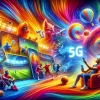
As the world stands on the brink of a technological revolution, there's a buzzword that seems to be on everyone's lips: 5G. The fifth generation of wireless technology is not just an upgrade; it's a game-changer, especially in the realm of live sports streaming. Imagine watching your favorite team play without a single buffering hiccup or pixelated moment. This is the promise of 5G, and it's set to redefine how we experience sports. In this article, we'll dive deep into how 5G is transforming live sports streaming, the benefits it brings, and the potential pitfalls to watch out for.
Understanding 5G: A Quick Overview
Before we delve into the specifics of sports streaming, it's crucial to understand what 5G is. In essence, 5G is the fifth generation of mobile network technology, offering faster speeds, lower latency, and greater capacity than its predecessors. While 4G brought us mobile broadband, 5G promises to connect virtually everything around us, allowing for seamless communication between devices. This leap in technology is akin to moving from a bicycle to a sports car. The speed and efficiency are unparalleled, opening doors to innovations we once only dreamed of.
The Benefits of 5G for Live Sports Streaming
1) **Ultra-Low Latency**: One of the most significant advantages of 5G is its ultra-low latency. For sports enthusiasts, this means almost real-time streaming with delays reduced to mere milliseconds. It's like being in the stadium without leaving your couch.
2) **Enhanced Video Quality**: With speeds up to 100 times faster than 4G, 5G allows for streaming in higher resolutions such as 4K and even 8K. Fans can enjoy crystal-clear images, capturing every detail from the sweat on an athlete's brow to the intricate patterns on a soccer ball.
3) **Seamless Multi-Angle Viewing**: 5G supports multiple camera angles and interactive features. Imagine switching between different camera views during a game without any lag. This capability enables a more immersive viewing experience, akin to having control over the director's cut of a live broadcast.
Real-World Examples of 5G in Sports Streaming
The impact of 5G isn't just theoretical; it's being tested and implemented in real-world scenarios. For example, during major sporting events like the Super Bowl or the Olympics, broadcasters have started utilizing 5G to provide enhanced viewing experiences. In South Korea, one of the pioneers in 5G deployment, the 2018 Winter Olympics showcased 5G-powered VR experiences, allowing viewers to feel as if they were skiing alongside athletes. This blend of technology and sports is just the beginning of a new era in broadcasting.
Common Mistakes to Avoid in the 5G Transition
1) **Overestimating Coverage**: While 5G promises widespread coverage, its availability is still limited in many areas. Relying solely on 5G networks without a backup can lead to connectivity issues, especially in rural or less developed regions.
2) **Ignoring Device Compatibility**: Not all devices are 5G-ready. Investing in new hardware without checking compatibility can result in unnecessary expenses.
3) **Underestimating Data Usage**: Streaming in higher resolutions like 4K consumes significantly more data. Users should be aware of their data plans to avoid unexpected charges.
The Future of Sports Streaming with 5G
Looking ahead, the fusion of 5G with augmented reality (AR) and virtual reality (VR) holds immense potential. Fans might soon experience live games through VR headsets, offering a 360-degree view of the stadium. Additionally, 5G could enable real-time data overlays, providing in-depth statistics and player insights as the game unfolds. This evolution will not only enhance viewer engagement but also open up new revenue streams for broadcasters and sports organizations.
Conclusion: Embracing the 5G Revolution
The impact of 5G on live sports streaming is profound and far-reaching. While there are challenges to address, the benefits it offers are too significant to ignore. As technology continues to evolve, so too will our viewing experiences, becoming more interactive, immersive, and personalized. For sports fans, the future looks incredibly exciting, with 5G leading the charge into a new era of connectivity.





























